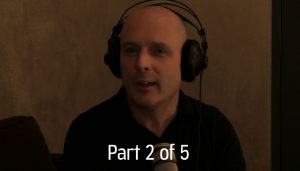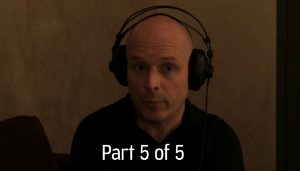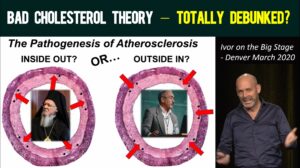FULL EPISODE NOW RELEASED: https://thefatemperor.com/dr-paul-mason-advanced-cholesterol-and-much-much-more-full-podcast-ep26/
Part 5 of 5 – Excellent conversation with super well-researched Australian doctor Paul Mason @DrPaulMason – recorded in Boulder, Colorado. This part covers the harms of Lectins, the FODMAP approach…and even Parkinson’s Disease
Full version of this podcast released tomorrow Sat 8th June – for those who want to pig out on excellent insights, all in one go 🙂
SUBSCRIBE here for latest releases: https://www.youtube.com/channel/UCPn4FsiQP15nudug9FDhluA
Here is the summary of PART 5 content – scroll down for the Transcript:
INDEX/CONTENT PART 5 of 5:
00:00:00 Dr. Steven Gundry, poisonous beans, more lectins and the toxic ricin
00:04:27 FODMAP foods, GMO fun, WGA from wheats, lots of bad actors
00:08:07 Nuts! (and Magnesium, Selenium etc.)
00:11:20 Moving forward and emphasizing the core – Pareto-style
TRANSCRIPT for PART 5 of 5:
Ivor 00:59:46 I did hear from what’s his name, Dr. Gundry, his book, “The Plant Paradox.” He came out very strongly and even study human, if you take a handful of these kidney beans, you don’t cook them which kind of you know detoxifies them, you can die. And the threshold limit value, the 50, TLD 50…
Paul 01:00:05 I don’t know if it’s ever been described in humans, but what has been described is that consumption of four kidney beans could almost be enough to put you in hospital with serious gastrointestinal distress, vomiting, diarrhea, dehydration.
Ivor 01:00:18 Yeah. And I think he went further to talk around actual toxicity leading to death, only no one does it because they all boil them. But I always say to people, what do you think of the food that if you don’t boil it, it can put you in hospital with only a few beans? Or even kill you. Does that sound like a good food?
Paul 01:00:37 Have you heard of ricin?
Ivor 01:00:39 Yeah, well, I know the subway poisoning incident in Japan – and it’s extracted, ricin sen is extracted from?
Paul 01:00:44 From castor beans.
Ivor 01:00:46 Ahh, that’s it! Yeah, yeah. I heard. Go ahead.
Paul 01:00:49 So this is, that’s the most (toxic), I think that’s the most toxic natural substance known to man. And it comes from a bean!
Ivor 01:00:56 Yeah, but…
Paul 01:00:57 They use it for nerve poison.
Ivor 01:00:59 True. Now, there are pretty exotic extractions to get the ricin purified…
Paul 01:01:03 Oh yeah. Nobody is going to be eating castor beans.
Ivor 01:01:06 No, no. True. But even the other one like the beans we just talked about, four or five of them uncooked could end you up in hospital.
Paul 01:01:14 Yeah.
Ivor 01:01:15 I mean meat, fish, eggs and all these things when you eat them, they’re never going to put you in hospital.
Paul 01:01:20 No.
Ivor 01:01:20 So all of the challenging foods appear to be in the plant world. that’s not to be “anti-plantfoods”, there are a lot of good plant foods that caused no issue.
Paul 01:01:28 Well, there’s a study I like to talk about, and they actually… so reflux is actually can be caused by lectins as well because the lectins can… there’s a cell called a mast cell, and it’s got these two little molecules. IgE molecules, lots of them. But if a lectin grabs the outside of these molecules which are attached to the mast cell, they do what’s called cross linking and they lead to release of its contents which is histamine. And if you release histamine in the gut, you then subsequently get the release of acid.
01:02:01 And they’ve done studies where they’ve actually had people go on a low carb diet for six days and actually put a probe measuring the acidity down into their esophagu. And they found a significant reduction in acidity within six days. Basically, you know, reversing reflux. And this is lectins which will do that.
Ivor 01:02:25 Right. So a low carb diet particularly…
Paul 01:02:27 … because it cuts out the grains.
Ivor 01:02:29 Yeah.
Paul 01:02:29 … and it cuts out the lectin rich foods.
Ivor 01:02:33 So then if you, and we’ll have to curve into closure now. I know we went expansive and now we go down to kind of conclusive. And, the lectins, you really should find out well, which of the vegetable world or plant world things I should eat that are truly safe?
Paul 01:02:50 Well, I say that, sorry, the point I was about to make is that this study they looked at 16 lectins for their ability to cause histamine release. And there was 4 that really stood out for having stonking great levels of histamine release. And that were all plant based lectins. So I think that talks to your point that the plant based lectins, and it doesn’t obviate animal source lectins from causing any harm at all. But the most deleterious ones, by far the most problematic ones are plant based.
Ivor 01:03:21 And it’s understandable, the old cliche plants can’t run away and we know they make lots of toxic compounds for antibacterial…
Paul 01:03:27 That’s not a cliche. I mean, that’s a fact.
Ivor 01:03:30 Well, I mean, it’s almost so much a fact that it’s almost cliched. It’s almost becoming obvious.
Paul 01:03:34 So do you know what they do now? Genetically modified organisms – so wheat germ agglutinin is such a powerful pesticide that they’re now creating crops, tomatoes and things like that, that have been genetically modified. They’ve had the sequence for wheat germ agglutinin put inside them into corn, for instance. So you might be saying, “Oh, I can’t have wheat products. I know that does something bad. Look, give me a tomato instead.” Good luck!
Ivor 01:04:03 Yeah. But the WGA from wheat, the wheat germ agglutinin, which is on the most problematic part that we eat, is finding its way…
Paul 01:04:09 Yeah, is now found in some GMO foods like tomatoes and corn.
Ivor 01:04:13 That makes things challenging indeed. So yeah, but let’s glide in gluten, wheat germ agglutinin, and a couple more things in wheat. So wheats are no go. But from the plant world, what are the most…
Paul 01:04:26 … the bad ones?
Ivor 01:04:27 Well, I even thought “what are the safest, most generic ones?” I mean, for me, it’s broccoli, cauliflower etc. which were bred in the 15th century. They’re generally seem to not have much reaction in humans…
Paul 01:04:40 Yeah.
Ivor 01:04:40 … for your classic veg. Maybe some of the root vegetables., above ground leafy green vegetables generally seem to be relatively benign. I mean, what were the selection of vegetables for most people? Not for all, but for most people, a selection of vegetables that you can depend on to be on likely to cause a major issue?
Paul 01:04:58 Yeah. So…
Ivor 01:04:59 Tough.
Paul 01:05:00 That’s really tough because I mean, you can look at anything. So you can look at FODMAP content which is fermentable, polysaccharide, disaccharide, monosaccharide, and polys. And certain vegetables, they’re really high and if you’re subject to irritable bowel syndrome, you can’t have those fiber, excess fat. So there’s a hell of a lot of fiber in cauliflower and that causes… so fiber causes constipation.
01:05:22 That’s probably news to a lot of your listeners. But I’ll just very briefly talk about the mechanism. So the problem in constipation is you’re trying to pass something through a small hole. So how does making that something bigger solve the problem? This is analogous to adding extra cars to a traffic jam to try and clear the traffic. So fiber, and they’ve actually done some, the best study they’ve done on it has actually looked at varying levels of fiber, and they showed 100% resolution in all symptoms of constipation on a zero fiber diet.
Ivor 01:05:59 Yeah, I saw that one. That was based on a whole bunch of patients. 170 you had severe constipation?
Paul 01:06:04 No, I think in the 60s, they had 67 in the whole trial and I think the arm that went in ended up going on the no fiber was 41 patients.
Ivor 01:06:12 All right. It was even smaller than the recalled.
Paul 01:06:15 But the statistical significance was 0001 or something like that, because it was such a, it went from 100% symptomatic high to zero percent symptomatic low. The P value was just insane.
Ivor 01:06:31 I did get a shock. It was the first human trial I’d seen for anything (never mind nutrition) that had 100% response, massive response in the intervention group. 41 out of 41 went from three days between bowel movements to one. But then they gave them back half the fiber they were eating and they got half as bad as they were before. So they put a cherry on the top of that.
01:06:58 Now, those people had constipation. They had severe issues and I think the team did say, “Well look, this fiber, this generic fiber, not soluble fiber (I think it was more your classic brand wheat type fiber maybe.) But what they made the point was fiber attracts water and bulks in your body. And everything about fiber should make it make constipation worse. So they went ahead and did the experiment and they actually demonstrated, “Well, that’s what happens.”
01:07:25 But then what about for healthy people? A little bit of vegetable and fiber? The “biome” etc.
Paul 01:07:29 Well, that’s the thing is I mean, it depends on the individual. There’s a threshold that people have. I guess I’m reluctant to answer your question, what vegetables and what plant foods I would recommend, because if you pick the wrong individual, you’ll have a problem with most any plant food. Now some people will tolerate certain things. I mean, let’s take blueberries. So first of all, they’re loaded with sugar. They got 12% sugar, which a lot of people don’t realize, but they’ve also got a lectin-like compound in them. And they’re also very high, they’re a FODMAP-type food, very high in fiber.
Ivor 01:08:06 Yeah.
Paul 01:08:07 Let’s look at nuts which is another staple on a low carb diet. They are loaded with fiber and they cause… they’re frequently responsible for constipation and gastrointestinal distress. So I mean I have a lot of difficulty and I guess my response is well if you really want to have a plant food, it’s going to be a matter of trial and error.
Ivor 01:08:28 Yeah, I guess. If you if you eat meat, fish, eggs and healthy ancestral foods along with after you check herself for bad reactions, more benign types of plants and vegetables, bring in some nutrients, some nuts, I mean, Brazil nuts bringing a lot of magnesium, and you know there are…
Paul 01:08:47 Well they have promoted heavily for the selenium.
Ivor 01:08:50 And selenium as well, yes. And magnesium as well, I believe and selenium, actually Brazil nuts…
Paul 01:08:54 But they always have to wonder about the availability of nutrients within nuts.
Ivor 01:08:59 Well, if you’ve got firm nuts of course, I mean, I believe the magnesium was because the nut tree goes deep and it draws magnesium up and the modern, shallow planted, the modern mass-produced vegetables, the soil is depleted.
Paul 01:09:11 Yeah. No, they’re not technically a nut, but cashew nuts.
Ivor 01:09:16 They are legume, are they?
Paul 01:09:17 Yeah. Like peanuts. You know how they say that you can buy raw cashew nuts. You know, sometimes you have raw cashew nuts or roasted nuts? That’s a lie. You can’t buy raw cashew nuts. And the reason is, because they’re so incredibly toxic if they’re not already cooked. Workers, when they’re shelling them, they have to wear gloves because of the damage that the lectins will do to their skin.
01:09:43 Some of these things that people…
Ivor 01:09:45 I didn’t know that one.
Paul 01:09:46 I’m very reluctant to make a recommendation which in my heart of hearts, I feel will be harmful to somebody somewhere around there. I mean, I just don’t want to wear that.
Ivor 01:09:58 No, no, and and that’s fair enough Paul. I think in the coming years, all of this will get understood more. People will have CGMs and will understand their own body more, what they can and can’t do. I think people are going to get more awareness around the challenges with plant foods.
Paul 01:10:16 And I think GMO is an issue, is the conversation that hasn’t been had properly. I think the trouble is that people oppose it almost instinctively but without an understanding of why it should, why it should often be opposed. And I think certainly, you know, crossbreeding a wheat germ agglutinin into a tomato. And if people understood the effects and the deleterious nature of wheat germ agglutinin, I think they would be a lot more opposition than there currently is.
Ivor 01:10:49 Yeah. You’re talking about things that have a certain complexity that the average public will never… you’re right, there’s a luddite rebellion in some sense. A lot of the people who are against GMOs don’t really know why, they just know it’s new, it’s genetics.
Paul 01:11:02 If you can articulate an argument, it’s hard to gain traction.
Ivor 01:11:06 Yeah. And to be honest, I stay out of a lot of stuff. Because I stick to my focus, which is cardiovascular disease and some of the major problems we’ve talked about with a cholesterol and insulin, all the rest. GMO was a bridge too far for me.
Paul 01:11:20 To be honest, me too. I mean, I look at it and it’s something that I think is concerning from a public health perspective. Because it doesn’t affect me personally.
Ivor 01:11:30 No, and I think you have enough fish to fry with the fundamentals you’ve talked about here actually, that if we can get a lot of those CGMs and understanding insulin, understanding the problematic nature of certain plant foods and many other things, and understanding cholesterol properly to put it in context. I think we get all locked on the next five or 10 years. You know, we can move on to the mad stuff later.
Paul 01:11:54 Yeah. I think we’re still taking baby steps. We’re dealing with the “low-lying fruit” at the moment. I mean, it still sounds crazy, but we’re still trying to just remove excess sugar from the food supply. I mean, that’s the lowest lying fruit of all.
Ivor 01:12:09 So the baby steps first for all of us, you may be massively advanced ahead of the average doctor but you’re still going to be forced to take the baby steps to start fixing population health before we get on to the sexy stuff.
Paul 01:12:21 Yeah. I mean public health is public health. I mean, it’s archaic.
Ivor 01:12:26 It is, but that’s what we’re all out to transform in the following 10 years. All of us, right?
Paul 01:12:31 Yeah. And I mean, people like yourself. I mean, I have to be honest, I’m a little bit of a stalker. I listened to a few of your podcasts and you’re doing an incredible job. I mean, the advocacy that you’re able to do. You’re driving more change than a doctor and I can honestly say, with each single podcast you’re doing, you’re probably helping more patients than most doctors will in their careers.
Ivor 01:12:55 Wow! Well, thanks a lot, Paul. I hope that’s true. I noticed an element of true. We’re certainly trying really hard and of course, we’re promoting the calcium scans of those disease, people who are at massive risk. Maybe they’re thin outside, fat inside. They don’t know, they’ll find out.
Paul 01:13:09 But important thing is you’re promoting the solution.
Ivor 01:13:13 As well. It’s a two hander, as we always say, identify the people at risk, not just the overweight smokers, but also the slim TOFI’s – but then they need to know what to do. And it’s not just a medication, they need everything we’re talking about.
Paul 01:13:25 I thought you’re gonna say knock them out, man.
Ivor 01:13:29 I’m Irish, but I’m not that bad! Thanks a lot, Paul.
Paul 01:13:33 Thank you. I had fun.
Ivor 01:13:34 We’ll do another soon.








